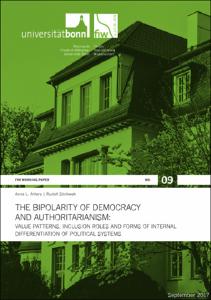Ahlers, Anna L.; Stichweh, Rudolf: The bipolarity of democracy and authoritarianism : value patterns, inclusion roles and forms of internal differentiation of political systems. Bonn: Forum Internationale Wissenschaft, 2017. In: FIW Working Paper, 09.
Online-Ausgabe in bonndoc: https://hdl.handle.net/20.500.11811/1153
Online-Ausgabe in bonndoc: https://hdl.handle.net/20.500.11811/1153
@techreport{handle:20.500.11811/1153,
author = {{Anna L. Ahlers} and {Rudolf Stichweh}},
title = {The bipolarity of democracy and authoritarianism : value patterns, inclusion roles and forms of internal differentiation of political systems},
publisher = {Forum Internationale Wissenschaft},
year = 2017,
month = sep,
series = {FIW Working Paper},
volume = 09,
note = {After World War II the political world was shaped by the ideological bipolarity of capitalism and socialism/communism for nearly 50 years. And there was a second bipolarity formulated by the distinction of democracy and totalitarianism. Both distinctions lost their relevance between 1970 and 1990. There was first the ‘discovery’ that some dictatorial regimes (e.g. Spain, Latin American populist dictators) could not meaningfully be called totalitarian but had to be understood as authoritarian. And then there was the breakdown of communism and socialism as political regimes after 1990. It was only on the basis of these two conjunctures that the disjunction of democracy and authoritarianism became the decisive bipolarity in modern political systems. This is the starting point of the argument of this paper. We agree and start with the observation that today’s world society exhibits a political regime bipolarity and we suggest a new approach towards defining and analyzing it, employing the sociological theory of inclusion formulated in sociological systems theory. We first of all distinguish democratic and authoritarian political regimes on the basis of identifying the different value patterns underlying collectively binding decision making and by analyzing the contingency and non-contingency of these respective value patterns. Democracy is understood as the political regime which is based on the ‘autopoiesis’ of its constitutive values, in authoritarian regimes we observe a ‘heterogenesis’ of values. To this argument about the production and stability of values we secondly add the idea that modern states are characterized by the imperative of individual political inclusion: under conditions of modernity and globalization, today all states, including the non-democratic ones, increasingly face the pressure to include individuals politically and they have to accommodate to this demand. However, there is still wide variation among regimes in how this is done, and there are new patterns for the inclusion of collectivities, related to the primacy of individual inclusion. Finally, and this is the third part of our argument, we believe that this approach allows the study of ongoing transformations of differentiation in both types of regimes. In this third part, we present a brief overview of the hierarchy of levels of modern polities and the horizontal differentiation of subsystems and organizations and we argue for the relevance of these two configurations for the comparative study of democracy and authoritarianism, which can also include an exploration of authoritarian traits in an otherwise democratic state, or of democratic elements built into an autocracy.},
url = {https://hdl.handle.net/20.500.11811/1153}
}
author = {{Anna L. Ahlers} and {Rudolf Stichweh}},
title = {The bipolarity of democracy and authoritarianism : value patterns, inclusion roles and forms of internal differentiation of political systems},
publisher = {Forum Internationale Wissenschaft},
year = 2017,
month = sep,
series = {FIW Working Paper},
volume = 09,
note = {After World War II the political world was shaped by the ideological bipolarity of capitalism and socialism/communism for nearly 50 years. And there was a second bipolarity formulated by the distinction of democracy and totalitarianism. Both distinctions lost their relevance between 1970 and 1990. There was first the ‘discovery’ that some dictatorial regimes (e.g. Spain, Latin American populist dictators) could not meaningfully be called totalitarian but had to be understood as authoritarian. And then there was the breakdown of communism and socialism as political regimes after 1990. It was only on the basis of these two conjunctures that the disjunction of democracy and authoritarianism became the decisive bipolarity in modern political systems. This is the starting point of the argument of this paper. We agree and start with the observation that today’s world society exhibits a political regime bipolarity and we suggest a new approach towards defining and analyzing it, employing the sociological theory of inclusion formulated in sociological systems theory. We first of all distinguish democratic and authoritarian political regimes on the basis of identifying the different value patterns underlying collectively binding decision making and by analyzing the contingency and non-contingency of these respective value patterns. Democracy is understood as the political regime which is based on the ‘autopoiesis’ of its constitutive values, in authoritarian regimes we observe a ‘heterogenesis’ of values. To this argument about the production and stability of values we secondly add the idea that modern states are characterized by the imperative of individual political inclusion: under conditions of modernity and globalization, today all states, including the non-democratic ones, increasingly face the pressure to include individuals politically and they have to accommodate to this demand. However, there is still wide variation among regimes in how this is done, and there are new patterns for the inclusion of collectivities, related to the primacy of individual inclusion. Finally, and this is the third part of our argument, we believe that this approach allows the study of ongoing transformations of differentiation in both types of regimes. In this third part, we present a brief overview of the hierarchy of levels of modern polities and the horizontal differentiation of subsystems and organizations and we argue for the relevance of these two configurations for the comparative study of democracy and authoritarianism, which can also include an exploration of authoritarian traits in an otherwise democratic state, or of democratic elements built into an autocracy.},
url = {https://hdl.handle.net/20.500.11811/1153}
}






